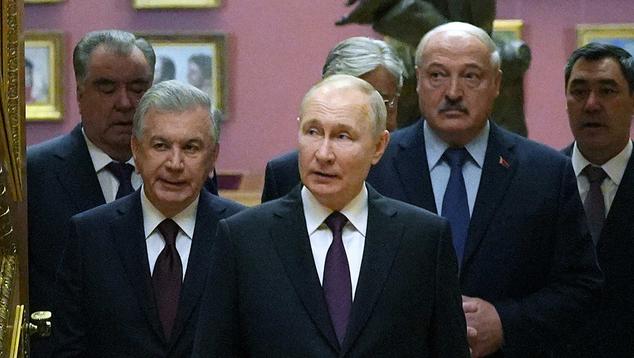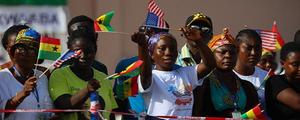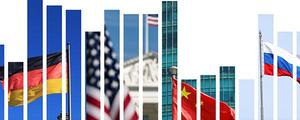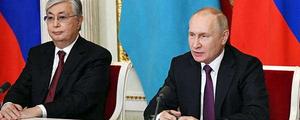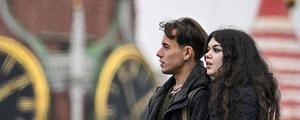This article is the fourth in a series detailing the results from the latest Rating World Leaders report, which analyzes trends in approval ratings of the leadership of the U.S., Germany, Russia and China in over 130 countries.
WASHINGTON, D.C. -- Russia continues to have an image problem two years after its invasion of Ukraine. This includes its own backyard where many post-Soviet states used to be the Kremlin’s biggest fans. In every one of those 12 countries polled in 2023, positive views of Russia’s leadership have declined compared with a decade ago.
Russia’s Popularity Wanes in Three Acts
Russia’s fall from favor didn’t start with its invasion of Ukraine. Since 2000, Russia has engaged in military conflict with its neighbors three times. After each armed intervention, Russia’s net approval score -- the difference between the percentage who approve and the percentage who disapprove of its leadership -- declined across more and more of its neighbors.
The first armed intervention occurred during the Russo-Georgian war in August 2008. While Georgians have not been fond of Russia’s leadership in recent memory, net approval notably dropped 27 points between 2008 and 2009. As no other country in the region exhibited a similar decline, the effect of this conflict on perceptions of Russia’s leadership appeared largely localized.
Russia’s second armed intervention in the region occurred in early 2014 after the Euromaidan protests in Ukraine. After Ukrainian President Viktor Yanukovych’s ouster, Russia incorporated Crimea into its own territory and supported an armed conflict in Ukraine’s eastern provinces by providing military personnel and assistance.
Net approval of Russian leadership plummeted 94 points in Ukraine between 2013 and 2014, but Russia’s aggression also likely affected perceptions in the Baltic countries. Net approval dropped 24 points in Estonia, 34 points in Latvia and 40 points in Lithuania. These military actions did not appear to dent Russia’s image to the same degree in other former Soviet states.
Russia’s third act, the invasion of Ukraine in February 2022, precipitated a marked decline in every country except Uzbekistan and Tajikistan (which was not asked about Russia in 2022). Perceptions of Russian leadership remained largely stable -- less than a 10-point shift -- in most countries between 2022 and 2023, except for Moldova, where net approval dropped another 19 points.
Reasons for the increasingly dour views of Russian leadership are partly unique to each country, but Russia’s turn from a stabilizing to a destabilizing and distracted regional force offers a shared theme.
The result is a loss in Russia’s relative approval advantage to China and the U.S. in its own backyard. In 2013, Russia’s net approval score exceeded that of China and the U.S. in eight of 11 countries. In 2023, its edge only remained in two of those countries -- Kyrgyzstan and Uzbekistan. (The leadership question about China and the U.S. did not appear on the 2023 survey in Tajikistan.)
How the Russian Diaspora Views Russia’s Leadership
A core ideological pillar in contemporary Russia is “Russkiy Mir” -- a set of linguistic, cultural and historical ties, or Russian heritage -- that purportedly forms a special bond between the Russian state and Russian-speaking people abroad.
Some of the largest ethnically Russian populations (per capita) outside the country exist in Estonia, Latvia and Kazakhstan. While net approval among those who identify as Russian in these countries has declined considerably in recent years, it remains higher when compared with their non-Russian counterparts.
Russia’s leadership justified the 2014 military intervention and the 2022 invasion of Ukraine as necessary to protect the Russian-speaking population in eastern Ukraine against the government in Kyiv. This justification remains heavily disputed. Patriarch Kirill, the head of the Russian Orthodox Church closely aligned with the Russian state, employs similar discourse to support Russia’s ongoing “special military operation” against Ukraine as a “holy war.”
This narrative -- combining a portrayal of Russia as the protector of its ethnic diaspora and a champion of traditional values against an allegedly decadent and morally corrupt West -- appears to have achieved some success among the Russian diaspora in neighboring countries. Russian diaspora members who say religion is an important part of their daily lives are the least critical of Russian leadership since the 2022 invasion.
Bottom Line
In the mid-2000s, most countries that emerged from the Soviet Union’s collapse held a neutral or positive view of Russian leadership. However, this gave way with each successive military intervention.
A wager in Russia’s war of choice against Ukraine is the assumption that this erosion is temporary and inconsequential. Aside from the possible exception of the Russian diaspora community in the region, there is scant evidence to suggest that two years into the conflict, a rebound in Russia’s image is around the bend.
Whether this damage proves sticky depends on several unknowns, including whether leaders and populations come to associate Russian foreign policy with all sticks, no carrots -- in which case, the drift away from Moscow provides further openings to other great powers to foster stronger strategic relationships with these countries.
To stay up to date with the latest Gallup News insights and updates, follow us on X.
For complete methodology and specific survey dates, please review Gallup's Country Data Set details.
Learn more about how the Gallup World Poll works.
